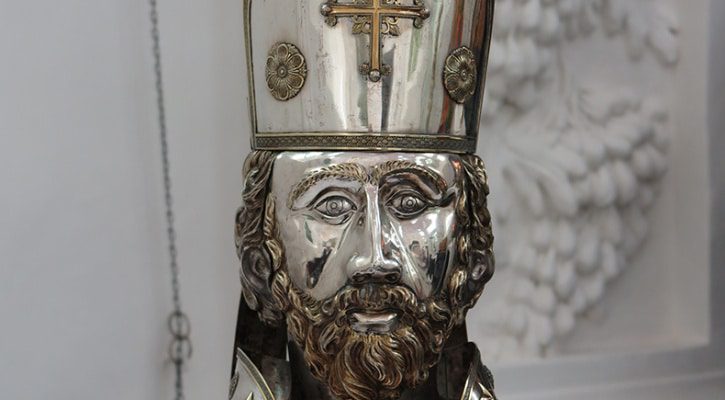
Image: Head Reliquary of Saint Cyprian in the St. Kornelius chapel of the abbey church of Kornelimünster Abbey in Kornelimünster | photo by ACBahn
Saint of the Day for September 11
(d. 258)
Saint Cyprian’s Story
Cyprian is important in the development of Christian thought and practice in the third century, especially in northern Africa.
Highly educated and a famous orator, he became a Christian as an adult. He distributed his goods to the poor, and amazed his fellow citizens by making a vow of chastity before his baptism. Within two years he had been ordained a priest and was chosen, against his will, as Bishop of Carthage.
Cyprian complained that the peace the Church had enjoyed had weakened the spirit of many Christians and had opened the door to converts who did not have the true spirit of faith. When the Decian persecution began, many Christians easily abandoned the Church. It was their reinstatement that caused the great controversies of the third century, and helped the Church progress in its understanding of the Sacrament of Penance.
Novatus, a priest who had opposed Cyprian’s election, set himself up in Cyprian’s absence (he had fled to a hiding place from which to direct the Church—bringing criticism on himself) and received back all apostates without imposing any canonical penance. Ultimately he was condemned. Cyprian held a middle course, holding that those who had actually sacrificed to idols could receive Communion only at death, whereas those who had only bought certificates saying they had sacrificed could be admitted after a more or less lengthy period of penance. Even this was relaxed during a new persecution.
During a plague in Carthage, Cyprian urged Christians to help everyone, including their enemies and persecutors.
A friend of Pope Cornelius, Cyprian opposed the following pope, Stephen. He and the other African bishops would not recognize the validity of baptism conferred by heretics and schismatics. This was not the universal view of the Church, but Cyprian was not intimidated even by Stephen’s threat of excommunication.
He was exiled by the emperor and then recalled for trial. He refused to leave the city, insisting that his people should have the witness of his martyrdom.
Cyprian was a mixture of kindness and courage, vigor and steadiness. He was cheerful and serious, so that people did not know whether to love or respect him more. He waxed warm during the baptismal controversy; his feelings must have concerned him, for it was at this time that he wrote his treatise on patience. Saint Augustine remarks that Cyprian atoned for his anger by his glorious martyrdom. His liturgical feast is celebrated on September 16.
Reflection
The controversies about Baptism and Penance in the third century remind us that the early Church had no ready-made solutions from the Holy Spirit. The leaders and members of the Church of that day had to move painfully through the best series of judgments they could make in an attempt to follow the entire teaching of Christ and not be diverted by exaggerations to right or left.
Saint Cyprian is the Patron Saint of:
North Africa
Posted by Franciscan Media.
Daily Reading
Memorial of Saints Joachim and Anne, Parents of the Blessed Virgin Mary
Readings for the Memorial of Saints Joachim and Anne, parents of the Blessed Virgin Mary Reading 1 JER 3:14-17 Return, rebellious children, says the LORD, for I am your Master;…
Daily Meditation
How to Be Good Soil
Click here for daily readings Jesus is the divine Sower who sows the seed of his word in the community of followers that he calls apart from the world. The…




